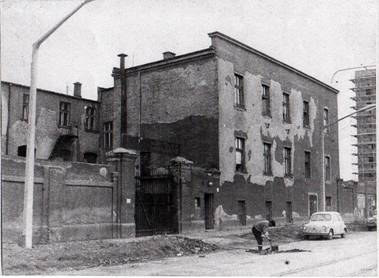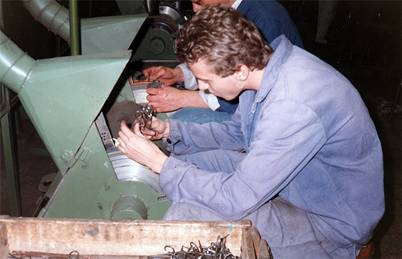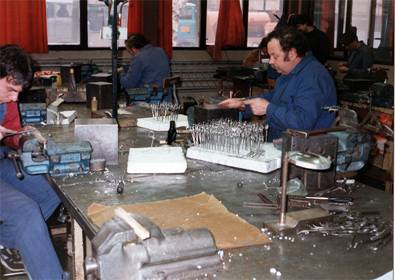 The city of Debrecen has always had traditions in the manufacturing of medical instruments; initially, they were associated with the medical technicians working under handicraft circumstances. In response to the industrial objectives set for our developing country at that time, these craftsmen were combined to launch the operation of the Medical Instrument Factory of Debrecen on 1 July 1950, at the business site of the Iron and Copper Furniture Factor at in Ispotály Street.
The city of Debrecen has always had traditions in the manufacturing of medical instruments; initially, they were associated with the medical technicians working under handicraft circumstances. In response to the industrial objectives set for our developing country at that time, these craftsmen were combined to launch the operation of the Medical Instrument Factory of Debrecen on 1 July 1950, at the business site of the Iron and Copper Furniture Factor at in Ispotály Street.
In 1964, the company became a member of Medicor Works having nationwide significance, and from the dame year production was relocated to a new factory building to support the introduction of new products and further exploitation of market opportunities.
The manufacturing orientations of the company were also defined:
The Company relied on a uniform concept of efficient technical development and market policy to achieve dynamic growth, and soon it became the dominant actor of the domestic medical engineering industry and an important international factor abroad.
The company was capable to driving an own development of medical engineering devices.
In its specialized field, as early as in the 1980s the company belonged to the 15 largest exporters of the global market, its products were used in 70 countries of five continents, it operated commercial and service offices in more than 15 countries alongside own subsidiaries and enterprises of mixed ownership.
In 1976, the Company acquired the German-based medical handware trading company TIM and made it a partner, and from that time onwards we can speak of continuous exports to Western Europe. In the 30 years since then, the number of employees in the Debrecen affiliate has grown from 9 to 2300.In 1988, Medicor Works joint quality development activities, and as one of the pioneering four companies in Debrecen it introduced Total Quality Management (TQM),
In February 1988, the Debrecen member company was transformed into Medicor Orvosi Műszeripari Rt (MOMI Rt.), which continued to operate as a legally and economically independent organisation. This created a company based on the experience of medical instrument manufacturing, in which new forces of development were given scope and opportunity in line with the change of economic system. In January 1991, MOMI Rt. decided to transfer the manufacturing and distribution of hand instruments to a new company, separating it from its previous manufacturing profile and establishing Medicor Kéziműszer Orvosi Kéziműszer Gyártó és Forgalmazó Kft. The management adopted the principle of standardising the quality of its products regardless of the market and striving for the highest quality throughout its operations.
The company purchases the semi-manufactures needed for the production activities, or if it is not possible, the base materials required for the preparation of semi-manufactures from Germany. In this manner, the quality of the products is guaranteed in terms of both material quality and shape. Other factors of product quality include corrosion resistance, which is dependent on the quality of the surface and its status of heat treatment. Surface smoothness is ensured by the operations run by the given technologies, such as electropolishing, grinding, polishing or matting, while the homogeneous texture is given by protective gas heat treatment. As required by the international standards, corrosion resistance is examined on each article. Finished products are separately tested for the uniformity of size, shape, operation and the product itself, as well as corrosion resistance by the quality control organization acting independently from production.
On 31 May 1998, the company was transformed into a new legal form and Medicor Kéziműszer Rt. was established.The number of employees at that time was over 650. In 1999, it established the wholly owned Pályi Orfahrosi Műszergyártó Kft. with 45 employees to exploit its site in Hosszúpályi. The headquarters and two ready-made production plants, as well as the machining, heat treatment, tooling and maintenance workshops serving them, are located in Debrecen and Egyek. In 2000, the company acquired 80 % of the shares of its trading partner Tuttlinger Instrumenten Manufaktur Gmbh (TIM), a company based in Germany. In 2005, in order to achieve its longer-term goals - taking advantage of cheaper labour - the company built the subsidiary Meder S.R.L. in Érmihályfalva, Romania, and Medimar S.R.L. in Margitta, Romania.
Within the meaning of Directive 93/42 EEC, since June 1998 only products affixed with “CE” markings could be delivered to the countries of the European Union. The products of the company belonged to Class I, which meant that after the elaboration of the appropriate technical documentation and the conclusion of a contract of representation with a partner that had a business site within the European Community, and with the availability of the manufacturer’s declaration the “CE” marking could be affixed to our products.
With its products, in 1994 the company applied for the Excellent Hungarian Product prize. On the basis of the tests and examinations performed, all our products were found to be eligible to use this emblem.
For the domestic distribution of medical hand instruments, the approval of the Institute of National Hospital and Medical Engineering (ORKI) was needed. After the establishment of independent hand instrument manufacturing operations, in 1994 the company had its products tested, and on the basis of the examinations all the articles of the manufactured product range were granted the necessary marketing licenses.

In 2000, the company applied for the National Quality Award, and in the medium-sized category it was announced to be the winner. As the winner of the IIASA-Shiba Award (IIASA-Shiba Award: it is to recognize the performance of the successful users of the TQM system all over the world) and the National Quality Award, the company became a member of the National Quality Club, and therefore within the Club and at other forums they could disseminate their experience earned in the application of TQM.
In 2002, the company applied for the European Quality Award, and was granted the certificate of Recognised for Excellence.
At the present, the Company’s current range of products consists of more than 10,000 own products, which fully embrace and satisfy the demands of modern human and veterinary medicine, and furthermore there are nearly 3,500 other products tailor-made for special customer requirements.
Production is performed in series of various volumes: even from demands for 1–2 pieces per type to monthly orders of 6–8 thousand articles. Therefore, we satisfy the unique demands of hospitals and private practitioners for smaller numbers of broad-ranging articles, and at the same time deliver tens of thousands of products to wholesalers.
Our current headcount: 240 employees.